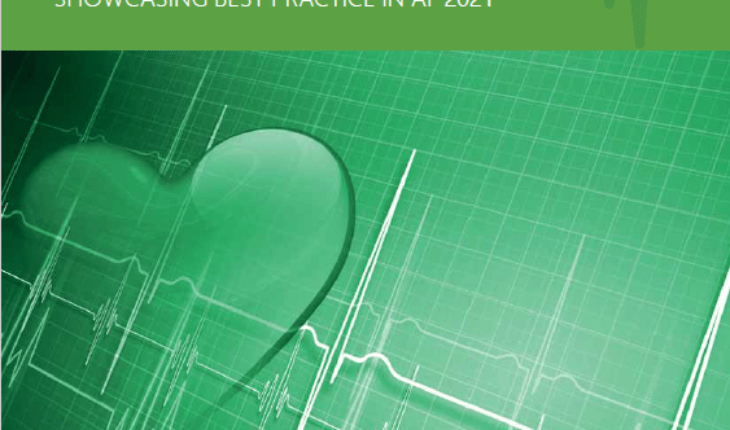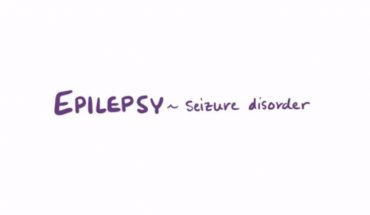AF Association Healthcare Pioneers Report: Showcasing best practice in AF 2021: Today, to mark the start of Global AF Aware Week 2020, the AF Association has published its annual Healthcare Pioneers Report. Each year, the Healthcare Pioneers Report showcases the most innovative approaches to detecting and managing atrial fibrillation (AF). The aim is to provide models of best practice that other centres, across the globe, can adapt to improve the care and quality of life with people with AF.
The 11 Healthcare Pioneers in this year’s report include: the use of digital technologies to Detect AF in non-healthcare settings; multidisciplinary approaches to optimise anticoagulation to Protect against AF-related stroke; and harnessing the power of cardiac rehabilitation to Perfect the patient care pathway. An international panel of judges — including President of Arrhythmia Alliance and Co-Founder/Trustee of AF Association Professor John Camm — selected the case studies from more than 25 submissions across the globe. The judges, given the exceptional quality of submissions, were tasked with the difficult challenge of identifying case studies that showcased the most original and effective approaches to improving the management of AF. They specifically looked for Healthcare Pioneers who focused on meeting the needs and wants of patients in their approaches.
Mrs Trudie Lobban MBE, Founder and CEO of AF Association says: “Despite great progress in the detection and management of AF, the need to identify people with undiagnosed AF remains critical. We need to ensure that all people with AF receive the appropriate antithrombotic therapies to Protect against AF-related stroke and have access to the right treatments to Correct the irregular rhythm. Therefore, we publish the AF Association Healthcare Pioneers Report: Showcasing best practice in AF 2021 to highlight leading centres that have established innovative and positive advances in the diagnosis and management of AF.” She adds that the AF Association is grateful to all those who submitted case studies for the report this year and congratulates “the 11 winners who demonstrate excellent clinical practice and the development of AF services to improve patient outcomes and quality of life”.
Professor John Camm (St George’s University of London, London, UK), comments: “The Healthcare Pioneer Report initiative encourages healthcare professionals to showcase their best examples of recent developments in the health care of patients with AF. This global disease has reached epidemic proportions and we all need to pick up good methods of caring for people with this heart rhythm disturbance. When you read the report, you will appreciate the wide range of opportunities and solutions that have been described. Well done to all of you who submitted your ideas and on how they have worked out in practice.”
The AF Association Healthcare Pioneers: Showcasing Best Practice in AF 2021 has been launched as part of Global AF Aware Week (16–22 November), which raises awareness of AF. Applications for the AF Association Healthcare Pioneers Report 2022 will open in January 2021 and the winners will be announced during Global AF Aware Week 2021 (November 2021). Trudie comments: “We encourage everyone who is aware of, or actively engaged in the management of patients with AF, to share their examples of best practice.”
AF is the most common type of arrhythmia (irregular heart rhythm disorder) worldwide, affecting about 2–4% of all adults.1 It causes significant mortality and morbidity, with the risk of AF-related stroke being the greatest concern. If not receiving therapy, a person with AF may be up to five times more likely to have an ischaemic stroke than someone without AF. Furthermore, AF-related strokes are devastating — 20% of people die and 60% become disabled — and are often worse than strokes related to other causes. Also, as AF can be asymptomatic, many people do not discover that they have AF until they have had an AF-related stroke. Therefore, AF Association raises awareness of the need to Detect AF with a simple pulse check to Protect against AF-related stroke with anticoagulation and Correct the irregular rhythm with access to appropriate treatments, so that we can Perfect the patient care pathway.
The full report is available from the AF Association website at https://www.heartrhythmalliance.org/afa/uk/healthcare-pioneers
References
- Hindricks G, Potpara T, Dagres N, et al. 2020 ESC Guidelines for the diagnosis and management of atrial fibrillation developed in collaboration with the European Association of Cardio-Thoracic Surgery (EACTS). European Heart Journal 2020. https://bit.ly/2I04dmT [Date accessed 2 November 2020]
Appendix
Healthcare Pioneers 2021
Smart technology facilitated early diagnosis and integrated care of AF: The mAFA Programme
Professor Yutao Gao (Chinese People’s Liberation Army General Hospital, Beijing, China) and colleagues, including Professor Gregory Lip (Liverpool Centre for Cardiovascular Sciences, University of Liverpool, Liverpool, UK) used a mobile AF Application (mAFA) to perform targeted AF screening. People diagnosed with AF were then put on the AF Better Care (ABC) Pathway — “A” for anticoagulation to avoid stroke; ‘B’ Better symptom management; and ‘C’ for Cardiovascular risk and comorbidity management. Use of the mAFA app led to a reduction in a composite outcome of ischaemic stroke, systemic thromboembolism, death, and rehospitalisation.
AF Improvement in Derbyshire — A collaborative approach
With support from East Midlands Academic Health Science Network (EMAHSN), the Strategic Clinic Conditions & Pathways Team (NHS Derby & Derbyshire, UK) implemented a range of strategies to improve the diagnosis and management of AF in Derbyshire. These ranged from hosting AF & Hypertension awareness events to sending targeted letters with named practice outcomes to each Primary Care Network Clinical Lead. The approach will potentially prevent 271 AF-related strokes and 90 deaths, with avoided total NHS and social care costs of £5,270,000.
A consultant cardiologist led programme to reduce AF-related stroke
In partnership with Inspira Health, NHS Luton Clinical Commissioning Group adopted the Primary Care Atrial Fibrillation (PCAF) Service model, which is led by consultant cardiologists, to reduce AF-related stroke. The five-phase model ranges from running the AF-PRIMIS audits on the clinical system to a review of recommendations and subsequent actions at two months’ post clinic to determine outcomes. The programme led to 354 patients having anticoagulants prescribed, changed, or dose of direct oral anticoagulant increased.
Innovative AF detection in a rural community setting using the Fire & Rescue Service in Cumbria
The Academic Health Science Network North East and North Cumbria (AHSN NENC) allocated 470 AliveCor devices to different professional settings, including the Fire & Rescue Service in Cumbria, to Detect AF in people at high risk of AF. Cumbria FRS used the AliveCor device as part of their Safe and Well visits, which included pulse checking, alcohol reduction, smoking cessation, social wellbeing and falls. One woman, who was subsequently diagnosed with AF, said that had it not been for the visit of the Fire & Rescue crew, she may never had known she had AF and that she was at risk of a potentially life-changing devastating AF-related stroke. Overall, the AliveCor devices were used 169 times, detecting 11 abnormal rhythms (6.5% detection rate).
Community nurses preventing AF-related stroke in high-risk cardiac patients
As well as allocating AliveCor devices to the Cumbria FRS, AHSN NENC also allocated devices to the Cardiac Rehabilitation team, Community Stroke & Rehabilitation team and Community Nursing team in the region. These teams generated the highest detection rate of all places allocated the devices (23%). Additionally, improvements were seen in service efficiencies with increased remote monitoring of cardiac devices. This result demonstrates that new technology can positively impact work processes along with improving effective clinical care and benefits for patients.
Harnessing the power of cardiac rehabilitation: An effective interim service to screen and refer in AF management
Arrhythmia and Cardiac Rehabilitation Services, within the North Midlands NHS Trust, worked in partnership to initiate referral to cardiac rehabilitation services as soon as a patient was referred to the Arrhythmia Specialist Team. This simultaneous referral allowed the Cardiac Rehabilitation Services Team to instigate a series of immediate support and screening processes to allow prompt treatment and commence referrals to additional organisations that are required for comprehensive patient management.
Doing simple things well: Practice advisory implementation reduces AF after cardiac surgery
Dr Martina Buerge (Barts Heart Centre, Barts Health NHS Trust, London, UK) and colleagues implemented an AF after cardiac surgery (AFACS) strategy to reduce the risk of AF developing after a patient had undergone cardiac surgery, with a focus on early (re)introduction of beta-blockers. They found that their approach led to an increase in the number of patients receiving postoperative beta-blockers and a significant decrease in people developing AFACS. This approach ultimately led to 191 fewer people with AFACS per year in their hospital and a significant reduction in morbidity.
The NIHR Global Health Research Group on AF management: Helping defining AF care in Brazil, China, and Sri Lanka
Professor Gregory Lip (Liverpool Centre for Cardiovascular Sciences, University of Liverpool, Liverpool, UK) and colleagues, including Mrs Trudie Lobban MBE (Founder and CEO of AF Association), are working to identify
keys aspects of the detection and management of AF with the aim of bringing about changes that will benefit patients and that will influence future methods of AF care. Throughout the NIHR-funded, three-year programme, Lip et al have worked with partners/patients/carers to address country-specific (across Brazil, China, and Sri Lanka) training needs, define co-developed key research questions to assess needs, and implement effective “value for money” projects.
Protection of patients with AF in primary care: Outreach education through clinical consultations to develop anticoagulant consultation and decision-making skills
Wessex Academic Health Science Network, in collaboration with Dorset Clinical Commissioning Group, sought to optimise anticoagulation in people with AF in primary care. As part of the project, a multidisciplinary team worked together to identify AF patients for review with a focus on those who were not, or who were suboptimally, receiving therapies to Protect against AF-related stroke. Across all eight primary care practices involved in the project (878 patients overall), anticoagulation prescriptions increased (range 1.48%–5.72%). The project also identified significant numbers of patients receiving aspirin monotherapy (providing opportunities to ensure these patients were on appropriate anticoagulation).
Screening for AF within a South Asian community setting using a single-lead ECG
In a collaboration between the Universities of Greenwich and Kent, AF Association and two Sikh temples (Gurdwaras) in Gravesend and in Sheffield, six pharmacy students (of British Indian ethnicity) were trained by a clinical pharmacist to record single-lead ECGs using AliveCor Kardia Mobile devices. Individuals aged ≥18 years were invited to participate at the Gurdwara in Gravesend during the Global AF Aware Week 2019 and at the Gurdwara in Sheffield during a public health event in March 2020 (prior to COVID-19 restrictions being introduced). Six hundred and eight participants (average age 60 years; 96.1% British Indian) were screened at the two Gurdwaras and 10 (1.6%) were given possible AF diagnoses. A cardiologist approved five of these possible diagnoses and three patients qualified for oral anticoagulants.
Opportunistic screening for AF among culturally and linguistically diverse communities in Australia
Professor Tissa Wijeratine (University of Melbourne, Australia and Sri Lanka) and colleagues invited Sri Lankan Australians to participate in community health screening programmes where baseline information, such as demographics and CHA2DS2VASc score, was collected. Preliminary results from the study indicated that community-based screening programmes are feasible and safe. The results also showed that such programmes are good opportunities for addressing risk factors for stroke, such as paroxysmal AF, migraine, and poor glycaemic control. Early detection and management with pharmacological agents or lifestyle modification may mitigate stroke disability and mortality outcomes.
- Gut microbiome could delay onset of type 1 diabetes - 3rd April 2025
- The da Vinci 5 Robot Is Set To Transform Bariatric Care: - 31st March 2025
- Beyond money: the hidden drivers fuelling child food insecurity - 31st March 2025






